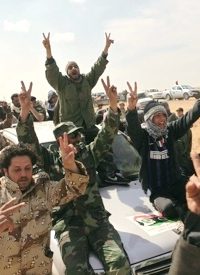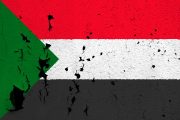
The North Atlantic Treaty Organization (NATO) is being heavily criticized for civilian casualties and a series of bombings apparently targeting essential non-military infrastructure in Libya, with some observers calling the actions war crimes. The Libyan rebels being supported by coalition forces have also been accused of wanton savagery and even crimes against humanity.
Most recently, a NATO bombing campaign near the Libyan city of Zlitan earlier this month reportedly killed almost 100 civilians — more than half of them women and children. The attack sparked a new wave of outrage worldwide as journalists and activists called for investigations.
Representatives of the Gadhafi regime took a large group of foreign reporters to the site. They were reportedly shown bodies of women and children, including the remains of a baby. Multiple bombed out homes were also presented to international journalists.
“Today was yet another crime by NATO against civilians,” Libyan regime spokesman Moussa Ibrahim was quoted by Fox News as saying about the attack, noting that over 1,000 civilians had been killed by NATO so far. “They are killing women and children. This happens every day. Help us to stop this madness.”
The Western military alliance defended the strikes, saying they were against “legitimate” targets. According to NATO spokespeople, the coalition believed the town was being used as a staging ground for pro-Gadhafi forces and tribes aimed at repelling an upcoming rebel invasion of Tripoli.
But the victims cited in news reports said that was not the case. "NATO bombed us, for what reason? We did not do anything to them. We are civilian people," a man who lost his daughter and his home in the strike was quoted as saying in The Australian newspaper. “Why did they kill us? We had peace in my house with our family. What did we do to the other countries?"
International law expert Franklin Lamb, writing in the Foreign Policy Journal from Tripoli over the weekend, accused NATO of committing a “massacre” after visiting the bombing site. Citing international lawyers, U.S. congressional staffers and human rights activists visiting the war-torn nation, he charged that NATO had “committed war crimes and crimes against humanity.”
Other foreign reporters — particularly from Russia — have been fiercely critical of the NATO campaign for months. “Do those who planned this and other crimes have a right to live? I’m talking about the Bilderberg club. What would they feel if their families are also deprived of a quiet life, and then killed in cold blood?” wrote Russian columnist Konstantyn Scheglikov following the bombings, attacking the “NATO maniacs who do not like the resistance of the small North African country.”
Other reporters who toured the site offered similarly devastating analyses of what happened. Mahdi Darius Nazemroaya with the Centre for Research on Globalization said civilians in Tripoli and other major Libyan cities were “bombed indiscriminately by NATO” in recent weeks.
“In Zliten, 85 people were killed including 33 children, 32 women, and 20 men as a result of NATO’s deliberate targeting of residential areas and civilian infrastructure,” he wrote, posting a dozen pictures showing the aftermath of the attack, which he called “photographic evidence of NATO war crimes.”
International human rights groups also had questions about the bombing. "NATO continues to stress its commitment to protect civilians,” said Amnesty International’s Hassiba Hadj Sahraoui in a statement. “To that effect, it should thoroughly investigate this and all other recent incidents in which civilians were reportedly killed in western Libya as a result of air strikes."
In addition to the hundreds or even thousands of “collateral damage” deaths so far, NATO is also under fire for air strikes on civilian infrastructure. On July 25, the Associated Press reported that the international coalition bombed a hospital, leaving several doctors dead.
Another infrastructure attack that drew international condemnation was the bombing of facilities associated with Libya’s so-called Great Man-Made River system, a pipeline that delivers water to a large percentage of the population. The Pakistan Observer said the attack was “a clear war crime” and could easily lead to a “humanitarian disaster.”
On July 30, NATO warplanes also repeatedly bombed a Libyan television station, killing three and injuring 15. Surviving journalists blasted the attack and called for international support from other reporters.
“We are not a military target, we are not officers in the army and not a threat to civilians,” the Libya Broadcasting Department Employees said in a statement after the attack, which it called an “act of international terrorism” and a violation of international law. “We are doing our job as journalists in representing what from the bottom of my heart we believe is the reality of the NATO aggression and violence in Libya.”
Countless press-freedom groups including the International News Safety Institute and the International Federation of Journalists have demanded an investigation of the attack. But NATO defended the bombing, saying the TV station was being used to spread pro-Gadhafi propaganda.
A separate incident in early August involving NATO’s alleged failure to rescue ocean-bound refugees in distress has also been widely criticized around the world. According to news reports, up to 100 people died escaping Libya on a rickety boat after the engine died and nearby NATO ships failed to respond to SOS calls.
“The idea that NATO, with all its surveillance technology, was not aware of a boat of this size is a story that not even Little Red Riding Hood would believe,” charged Italian Parliamentarian Roberto Castelli. The government of Italy has requested an inquiry to find out why the refugees were apparently left to die.
The internationally backed rebels trying to seize power in Libya have also been accused of numerous war crimes and wide-scale barbarity — some of it too horrendous even to mention. Numerous gruesome videos have been posted online showing beheadings, lynchings and other crimes, proving that at least some of the allegations are true.
“The evidence provided by these videos makes clear that the rebels’ conception of warfare has more in common with that of Al-Qaeda than that of the Geneva Conventions,” explained John Rosenthal in a piece for the U.S.-based Hudson Institute. “The abuses documented in the videos could serve as textbook examples of precisely the sort of savagery that the Geneva Conventions were supposed to prevent.”
As The New American and countless other sources have reported, the NATO-backed rebels are, in many cases, led by self-described leaders of al Qaeda and other extreme Islamic groups that have boasted of battling American forces everywhere from Iraq to Afghanistan. Some of the leaders are even former U.S. prisoners who were held in Guantanamo Bay.
Suspicions about the rebels’ true motives and supporters were also raised when the self-proclaimed Interim Transitional National Council announced the creation of a new central bank weeks after the NATO invasion. It remains unclear whether the new monetary authority will follow the Gadhafi regime’s state-owned model, or if it is to be privately owned like the U.S. Federal Reserve.
Though Western powers were arming the rebels well before intervention became official, the Obama administration and NATO publicly intervened in Libya in mid-March to enforce a United Nations resolution. Since then, the “mission” has morphed into “regime change,” with foreign powers hoping to oust dictator Moammar Gadhafi and install the rebels as the new government.
Without congressional approval, which Obama himself acknowledged in 2007 is required by the U.S. Constitution prior to foreign militarism, critics have charged that American involvement is itself illegal. And while the administration has already informed Congress that it would ignore any attempt to rein in the war, critics worldwide are still hoping that there will eventually be some accountability and justice if crimes were indeed committed.
Photo: Rebel fighters flash V-victory sign, at the debris of the communication center bombed by NATO aviation, when it was still under control of Moammar Gadhafi forces, Brega, Libya, Aug. 15, 2011.: AP Images



